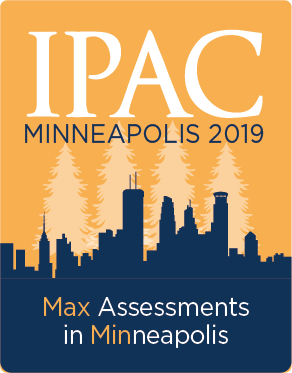Background and margins can also be set for the layout or for the placeholder within the page template.
Use CSS to fine-tune appearance and behavior. <a href="http://help.wildapricot.com/display/DOC/Gadgets#Gadgets-HTMLandCSSparameters/?utm_source=contexthelp&utm_medium=site&utm_campaign=contexthelp" target="_blank" >Learn more</a>
2019 IPAC Conference July 14-17, 2019 Minneapolis, MN Max Assessments in Minneapolis |
Conference Links Conference Program Attendee Information | 2019 Conference Call for ProposalsCALL FOR PROPOSALS
IPAC is the leading organization of applied HR selection and assessment professionals, with members actively engaged in practice, research, and training to meet the needs of both public and private-sector organizations. View below for CFP submission process details. Session formats include symposia, panel discussions, debates, roundtables, tutorials, paper presentations, and student posters. Registration details to be announced soon. If you have questions, please contact the conference committee at conference@ipacweb.org.
|
IPAC 2019 Annual Conference Max Assessments in Minneapolis Call for Proposals
Conference Dates: July 14 – 17, 2019
About IPAC
IPAC is a nonprofit organization of over 200 human resource professionals actively engaged in or contributing to the professional, academic, and practical field of personnel research and assessment. The Annual Conference offers professionals the opportunity to share their latest research, programs, and ideas with their peers. Since its origins in International Personnel Management Association Assessment Council (IPMAAC) over thirty years ago, IPAC's greatest strengths have been its members’ commitment to building a solid theoretical and applied research foundation for their professional activities and the spirit of cooperation and mutual support that pervades the organization.
You are cordially invited to be a part of that IPAC tradition. Anyone may submit a proposal for consideration; membership in IPAC is not required. This call for proposals provides information you need to fully submit your idea. The following sections provide detailed descriptions of the submission components, as well as session types and example conference topic areas to help generate or focus submission ideas.
Examples of Conference Topic Areas
All topics in the area of personnel assessment, including selection, legal issues, performance management, training and development, and leadership and succession planning are welcome at the conference. IPAC recognizes the value of assessment across the HR continuum as HR fulfills its role of strategic partner in the organization’s pursuit of its mission, vision, and business goals. The list below provides a sample of program topics that are welcome at the conference: Challenges and Innovations in Personnel Assessment As organizations and the nature of work continue to change, how are personnel assessment practitioners meeting the challenge? What innovative approaches have been employed to handle issues such as the assessment of teams and the use of non-traditional assessment techniques? Using Data to Help Drive Decisions Data can be powerful. From building a case for assessment in your organization to making business decisions and developing organizational strategies, the form and function of the data collected and presented can greatly influence your success. What data (or presentational format of data) do you find to be the most persuasive to different audiences? How do you showcase the value added of assessments, given the additional costs associated with their use? How do you use data to help drive your business? Programs and Practices Demonstrating Excellence in Assessment The focus of this program component is on sharing “sound practices” with colleagues. Have you developed an effective program to address a specific personnel assessment challenge? Have you designed a leadership development program to address today’s challenges? What steps have you taken to ensure your performance management program promotes employee development? Information Technology in Personnel Assessment How is the use of information technology changing capabilities in personnel assessment? How have video, computer-based, and Internet testing been incorporated into selection programs? How can we use technology to enhance and expand training and development opportunities? Strategies/Techniques for Managing the Assessment Function The focus of this component is on the management of the assessment program. What approaches have you found to be effective in managing an assessment program that meets legal and professional standards as well as the needs of your organization/client? Have you incorporated assessment into leadership development? Have you developed a telework program to ensure employee engagement and success? Responses to Change/Role of Assessment Professionals What strategies have you employed to meet the challenges of civil service reform, regulatory changes, quality initiatives, and/or downsizing? How is the assessment function impacted by environmental changes, and how do assessment professionals assist in facilitating these changes? Has the assessment function had a role in change management in your organization? Assessment-Related Research What research projects have you been involved with, either in a workplace or academic setting? Have you, or someone you know, recently completed a thesis or dissertation on a topic related to personnel assessment?
Session Formats
Session formats include symposia, panel discussions, debates, roundtables, tutorials, paper presentations, and student posters and are described as follows.
Symposium (Length: 60 or 90 minutes)
A symposium is a group of usually three to five presenters, each of whom makes a presentation on the selected topic or problem. Effective configurations of presenters include: (1) individuals from different work settings discuss their experiences with a given problem; (2) individuals with different opinions or interpretations of a topic; (3) individuals offering alternative solutions to the problem; and (4) individuals with in-depth knowledge of different aspects of a topic.
Length: Abstract (150 words), Proposal Narrative Summary (MIN: 500 words; MAX: 2,000 words)
Panel Discussion (Length: 60 or 90 minutes)
In contrast to a symposium, a panel discussion is designed to generate spontaneous interaction among participants and between participants and the audience. The chairperson of a panel discussion must be knowledgeable about the topic to serve as a moderator, pose pertinent questions to participants, ensure that each panelist has the opportunity to speak, and guide the flow of the discussion. Although diversity of perspectives among panelists is often a key to success, panels that present innovations, programs, or research are also appropriate. Proposals must describe: (1) the themes to be discussed; (2) questions to be addressed; and (3) the proposed session’s structure.
Length: Abstract (150 words), Proposal Narrative Summary (MIN: 500 words; MAX: 2,000 words)
Debate (Length: 45, 60 or 90 minutes)
Debates aim to present opposing perspectives or views on a single topic. The structure of the session should include one or two presenters on each “side” of the debate, as well as a session moderator. The moderator is responsible for introducing the topic of interest and managing the debate; the moderator may also serve as the session discussant to summarize and contextualize the discussion for session attendees. Submissions should include: (1) a description of the topic of interest; (2) the major points that will be discussed by opposing sides; and (3) questions for discussion and debate.
Length: Abstract (50 words), Proposal Narrative Summary (MIN: 500 words; MAX: 2,000 words)
Roundtable (Community of Interest) (Length: 60 or 90 minutes)
Roundtables are designed to connect individuals with common interests and to share unique perspectives, experiences, or challenges, generate new ideas, etc. Participants can come together to openly exchange experiences related to assessment challenges or issues. The ideal structure of the session includes two or three ‘hosts’ of the session who are responsible for introducing the topic(s) of interest and facilitating the discussion with the audience. Audience participation is critical to the success of these sessions. Submissions should include: (1) a description of the topic(s) of interest and (2) questions to engage the audience in discussion.
Length: Abstract (50 words), Proposal Narrative Summary (MIN: 500 words; MAX: 2,000 words)
Tutorial (Length: 90 minutes)
A tutorial provides in-depth coverage of a topic. Tutorials aim to help the target audience develop new skills or enhance existing skills. Tutorials are not lectures; they are interactive sessions or “workshops” that afford an opportunity to gain “hands on” experience applying new skills and to discuss problems and issues related to the subject. A tutorial may be presented by one or more persons. Proposals must describe: (1) the topic of interest; (2) the interactive activities planned; and (3) the audience level for which they are appropriate [i.e., Foundational (basic), Practitioner/Researcher (intermediate), or New Insights (advanced)].
Length: Abstract (150 words), Proposal Narrative Summary (MIN: 500 words; MAX: 2,000 words)
Paper Presentation (Length: 30, 45, or 60 minutes)
Individual paper presentations may also be submitted. Individual paper presentations focus on a selected topic or problem. Authors need not have completed a formal research paper for publication; instead authors may present a topic, challenge, or problem related to personnel assessment, best practices, recommended strategies, or alternative approaches, and results or outcomes of actions taken. The proposal may take the form of an executive summary or write-up of a topic of interest. If the proposal focuses on empirical research, the proposal must describe the study’s contribution to the field and methodology used for data collection. The Program Committee will assign accepted proposals to a session comprising two or three presentations on related topics.
Length: Abstract (50 words), Proposal Narrative Summary (MIN: 500 words; MAX: 2,000 words)
Student Poster (Length: 60 minutes)
The poster session is designed for current students to showcase their academic or applied work in any of the topic areas listed above. During the conference, a moderator (or discussant) will introduce the presenters and encourage audience participation. Each presenter will have the opportunity to provide a short introduction of their research to audience participants. Afterwards, audience members are encouraged to engage presenters in discussion. Submissions typically include completed research, applied projects, or theoretical work. In-progress research/applied projects may be featured if data collection is underway; however, authors must present completed work at the time of the conference.
Length: Abstract (50 words), Proposal Narrative Summary (MIN: 500 words; MAX: 2,000 words)
Submission Process
Proposals must be submitted using IPAC’s online submission system [click here].
To register with the system, you will need to provide your email address and create a password to log in to the system. Please select a password that you will remember.
A submission has two components: (1) an online form that you will complete to provide basic information about the session and the presenters; (2) a proposal or detailed session description containing the content of the submission.
To complete the online form, you must provide:
After submitting your online form and proposal, you will receive a confirmation email including a proposal ID. You may log in to the system to make revisions to your proposal until the submission deadline has passed – 5:00pm (EST) January 6, 2019.
Review Process and Notification
Proposals will be reviewed by the Program Committee for technical soundness, theoretical and/or practical significance, and interest to the conference attendees. You will be notified by e-mail regarding acceptance/rejection of your proposal. Please be sure to include an accurate e-mail address for the presenter who wishes to receive correspondence regarding this submission.
Presenter Requirements
All presenters must—
Questions?
Questions about the submission process may be directed to program@ipacweb.org. For more information about general conference planning activities, please email the Conference Chair at conference@ipacweb.org. Proposals are due by 5:00 PM EST on February 3, 2019. Click here to submit a proposal. |


